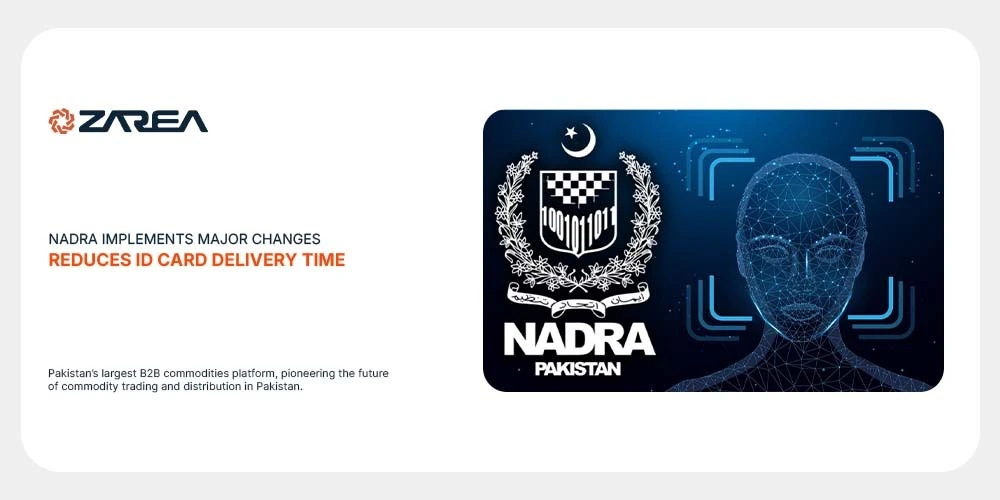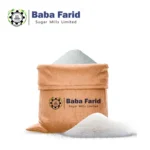Major Implements with NADRA Identity Card Delivery Time Reduction:
The National Database and Registration Authority (NADRA) has made significant improvements to streamline the issuing of national identification cards and strengthen the nation’s identity security system, marking a new era for digital identity management in Pakistan. NADRA identity card delivery time reduction for new CNICs has now been cut in half, which is one of the most noteworthy developments and good news for millions.
Modernizing the identity system, getting rid of fraudulent registrations, and enhancing the general citizen experience are the goals of this upgrade and a number of more extensive regulatory adjustments. Let’s talk about what this implies for you and how it mirrors Pakistan’s larger digital revolution.
To see biomass products and building materials, current prices, and to place your bulk purchase, visit Zarea right now!
CNICs are now delivered in 15 days – Faster ID card processing:
It used to take up to 30 days for candidates in the regular category to get their CNIC. This waiting period is now only 15 days because of the most recent upgrade.
A brief summary of the revised processing timeframes is provided below:
- Normal CNIC: Now delivered in 15 days (previously 30)
- Urgent CNIC: Delivered in 12 days for a fee of Rs1,150
- Executive CNIC: Delivered in 6 days for a fee of Rs2,150
- First-Time Applicants: Free of charge (as before)
This reduction is a strategic step by NADRA to encourage more citizens. Especially unregistered individuals can easily apply for their ID cards without delays or bureaucratic hassle.
Enhanced Security Features Without Extra Cost:
As part of its reforms, NADRA has also introduced advanced features to improve the security and functionality of identity cards—even non-chip Teslin cards. The most notable updates include:
- Names and parentage will now appear in both Urdu and English
- QR codes have replaced thumb impressions to enhance digital verification
- Security upgrades align with smart card-level protection, without increasing the fee
Crucially, NADRA has maintained accessibility and affordability, particularly for low-income people, by keeping the card charge constant.
Enhancing Pakistan’s Identity System – Important Regulatory Changes:
2002 The National Identity Card Rules have undergone a thorough revamp. Interior Minister Mohsin Naqvi‘s decree which resulted from these modifications goes beyond simple cosmetic adjustments.
Here’s a snapshot of the key reforms announced under the updated NADRA news:
Child Registration Overhauled
NADRA has introduced stricter guidelines for the Child Registration Certificate (CRC):
- Birth registration with the Union Council is now mandatory before CRC issuance
- Children under 3 years are exempt from biometrics
- Ages 3–10 require a photograph and, if available, iris scan
- Complete biometric information, including fingerprint and iris scans, must be provided by those aged 10 to 18.
It will now be simpler to monitor and maintain proper identification records as each child will obtain a unique CRC with a validity term.
Family Registration Certificate (FRC) Given Legal Status
The FRC now has legal standing, and citizens can obtain it solely based on NADRA’s records. There are now three recognized family types:
Alpha – by birth
Beta – by marriage
Gamma – by adoption
The updated FRC will also include details of men with multiple marriages, reducing ambiguity and improving transparency.
Women with Choices in Identity Empowerment:
Married women may now choose whether to have their husband’s or father’s name appear on their ID card thanks to a progressive change made by NADRA. In addition to encouraging gender-sensitive adjustments in official paperwork, this policy shift recognizes individual identification preferences.
Legal Framework and Digital Integration:
NADRA’s Digital Integration – The revised rules introduce clarity to Pakistan’s identity laws by providing formal definitions for key terms like:
Biometrics: Now officially defined as unique data from facial features, fingerprints, or behavior.
Confiscation, cancellation, digital marking, and intruders: Clearly outlined for the first time.
These definitions will now guide national institutions including the State Bank of Pakistan (SBP), FBR, PTA, and others in harmonizing their identity verification systems with NADRA.
Transparency and Accountability in Verifications:
NADRA’s Transparency – Historically, many citizens have struggled with the confiscation or verification of their identity documents. Under the new rules:
- Verification boards at district, regional, and headquarters levels must resolve all cases within 30 days.
- The same verification timelines now apply to CRC and FRC certificates.
- Citizens can now voluntarily correct incorrect identity records through NADRA’s mobile app or service centers without legal penalties.
This system promotes self-correction, helping to eliminate fake identities and prevent misuse.
Why These Modifications Are Important:
NADRA’s 2024 revisions are more than just changes to legislation. Meanwhile they are part of a modernization effort that has strengthened national security so far. They also build public confidence, and combine identity systems with cutting-edge technologies.
These reforms will:
- Speed up service delivery
- Minimize data errors
- Help fight identity theft and fraud
- It gives people more authority over their personal data.
Final Thoughts:
These developments are encouraging evidence of Pakistan’s dedication to an inclusive government and transparency. Everyone who follows NADRA News‘ benefits from digital transformation. You may apply for your first ID card or update your family’s information more quickly with NADRA’s 2024 changes. Be safe and intelligent with NADRA!
Stay informed about current developments and utilize the enhanced services to the fullest with NADRA.
FAQ’s:
How long does it typically take for a CNIC to be delivered?
The delivery time for a CNIC depends on the type of application submitted. NADRA offers three processing categories: Normal, Urgent, and Executive.
As of late 2025, a Standard CNIC generally requires 30–45 working days under the Normal category, approximately 12 working days under the Urgent category, and around 7 working days under the Executive category.
For a Smart NICOP, the estimated delivery times are 30 working days for Normal, 12 working days for Urgent, and 9 working days for Executive processing.
| Category | Standard CNIC (Approx.) | Smart NICOP (Approx.) |
|---|---|---|
| Normal | 30–45 working days | 30 working days |
| Urgent | 12 working days | 12 working days |
| Executive | 7 working days | 9 working days |
Note:
- These timelines are just guesses and may change depending on the situation. especially if an application isn’t finished or needs more proof.
- You can pay extra fee to have Id card delivered to your home.
- People who apply can check the status of their applications online. You can simply call NADRA’s help line +92 51 111 786 100 at NADRA’s Call Center.
What are the new rules of NADRA?
Three family types—Alpha (by birth), Beta (by marriage), and Gamma (by adoption)—are defined by the new regulations. Any unlisted family members must be registered by the individual. Inaccurate entries can be eliminated and corrections made using the NADRA offices or mobile app.
How can I check my CNIC tracking status?
To track your CNIC (Computerized National Identity Card) status in Pakistan. Send your CNIC number to 8300 You can use the NADRA SMS service. On the other hand, you can track your NICOP/POC (National Identity Card for Overseas Pakistanis/Passport for Overseas Citizens) application on the NADRA website.
Here’s how to use SMS to check your CNIC status:
Launch the text messaging app on your phone.
Enter your 13-digit CNIC number, excluding any spaces or dashes.
Text the number 8300.
A response with the owner’s address and zone data of your CNIC will be sent to you.
How to check father name by CNIC?
The sender might obtain the name and father’s name of that specific CNIC number by sending an SMS with the CNIC number on 7000 using a mobile device.
What is the fee for ID card in Pakistan 2025?
The costs for Smart National Identity Cards (CNIC) and Child Registration Certificates (B-Form) were revised by Pakistan’s NADRA (National Database & Registration Authority) in 2025. The standard processing charge for a new Smart CNIC is Rs. 750; executive processing is Rs. 2,500; urgent processing costs Rs. 1,500. The standard processing charge for the B-Form (CRC) is Rs. 50, and the executive fee is Rs. 500.
































